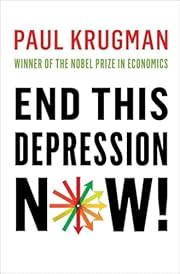

Click on a thumbnail to go to Google Books.
|
Loading... End This Depression Now! (2012)by Paul Krugman

Books Read in 2013 (400) No current Talk conversations about this book.   ) )That the developed world has been caught in a perfectly foreseeable, avoidable, solvable slump for four years now is so stupid it would be funny if it weren't so sad. Millions of man-years have been thrown away as the result of economic policies that shouldn't have passed the laugh test in an age where anyone can pick up a book on the Great Depression and read about what went wrong. Yet here we are, trillions of dollars poorer than we should be, standing by as elected leaders make decisions on faulty, imagined, or no evidence at all. Krugman is a lot more calm when he discusses these things and those people than I would be, and even though his perfectly reasonable prescriptions for economic recovery have an uphill climb to the lofty heights of discourse where real decisions get made, the fact that they are so straightforward and sensible gives me some hope for the future. This book is largely a synthesis of material from the past few years on his blog cleaned up, re-ordered, and organized, which would be somewhat disappointing if the material were not so strong. It reminds me of his earlier The Return of Depression Economics in its subject-hopping structure, but with a somewhat stronger central narrative in the vein of The Conscience of a Liberal. The book tackles many subjects familiar to frequent blog readers: the roots of the crisis; failures of monetary policy; the inadequacy of the stimulus; the roots and remedies for the Euromess; lessons of the Great Depression; and the illogic of conservative doctrines like "expansionary austerity", the "confidence fairy", and "immaculate inflation". Its prescriptions are those that have been tested by history: more direct public infrastructure spending, aid to states (or countries in the case of Europe), accommodative monetary policy including a temporarily higher inflation _target, and better trade and environmental policy. As he discusses and refutes objections to his analyses, the Republican Party is a frequent object of criticism, as are clueless European leaders, the finance-industrial complex, economists who have been either misinformed or unhelpful, and fatuous pundits. Krugman has been criticized for his dismissive tone towards people he disagrees with, and while he doesn't ever call someone an idiot outright here, he certainly doesn't spare feelings. Since I happen to agree with his analysis I don't mind when he calls someone out, but I would hope that readers of other political persuasions could concentrate rebuttals on disagreements over any of the facts he talks about and not get hung up over a dismissive tone or academic nerd burns. One of the things that should be obvious to everyone is that no one is helped by this recession-verging-on-depression, and we should all be looking for ways to solve this crisis without regard to the affiliation of who's proposed the solutions. Everyone has a stake in future prosperity, because a rising tide might lift all boats, but an ebbing tide will surely sink many. Krugman doesn't have quite the soaring rhetoric of his hero Keynes, but in clarity and rigor he should certainly be considered on the same plane. Here's hoping that important people check this book out, and that they will have the "Rooseveltian resolve" to take the courageous steps we need to get people back to work. The dismal science. It has lots of different ways of explaining how the economic and therefore real world works, but most of them are very wrong a lot of the time. However Krugman has a way of putting across his points in a reasonable clear and concise way. And most of what he says in this book makes sense. The fact that with low inflation and austerity measures in place, the only thing that an economy can do is contract further. That a government spending $1 will generate $1.50 of economic benefit, that light touch regulation will only be ridden rough shod over by the global elite. Lots of sense written in here, cannot see any politician reading it though.
Krugman pursues the questions of how bad the "Great Recession" really is, how we got stuck in what can now be called a depression and, above all, how we can free ourselves. No library descriptions found. |
Current DiscussionsNonePopular covers
 Google Books — Loading... Google Books — Loading...GenresMelvil Decimal System (DDC)330.973Social sciences Economics Economics Economic geography and history North America United StatesLC ClassificationRatingAverage: (4.09) (4.09)
Is this you?Become a LibraryThing Author. |
|||||||||||||||||||||||||||||||||||||||||||||||||||||||||||||||||||||||||||||||||||||||||||||||||||||||||||||||||||||||||